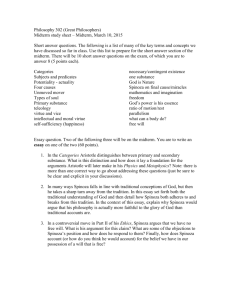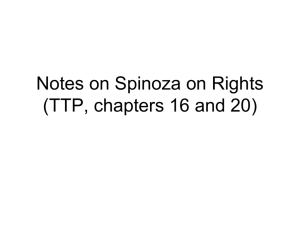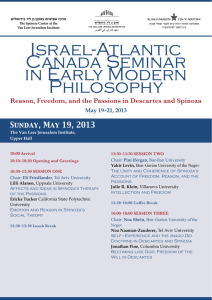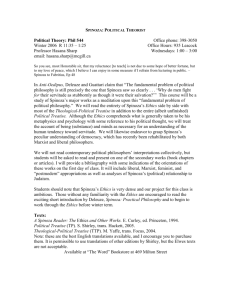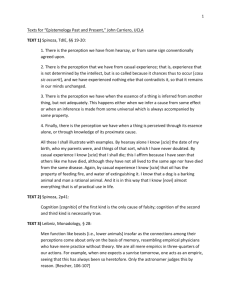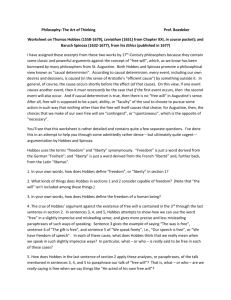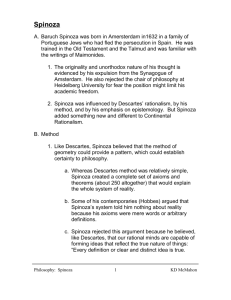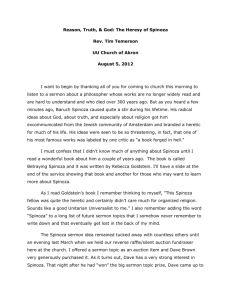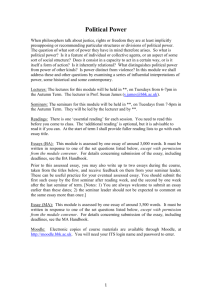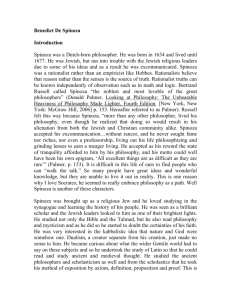Christian Lazzeri (ed
advertisement
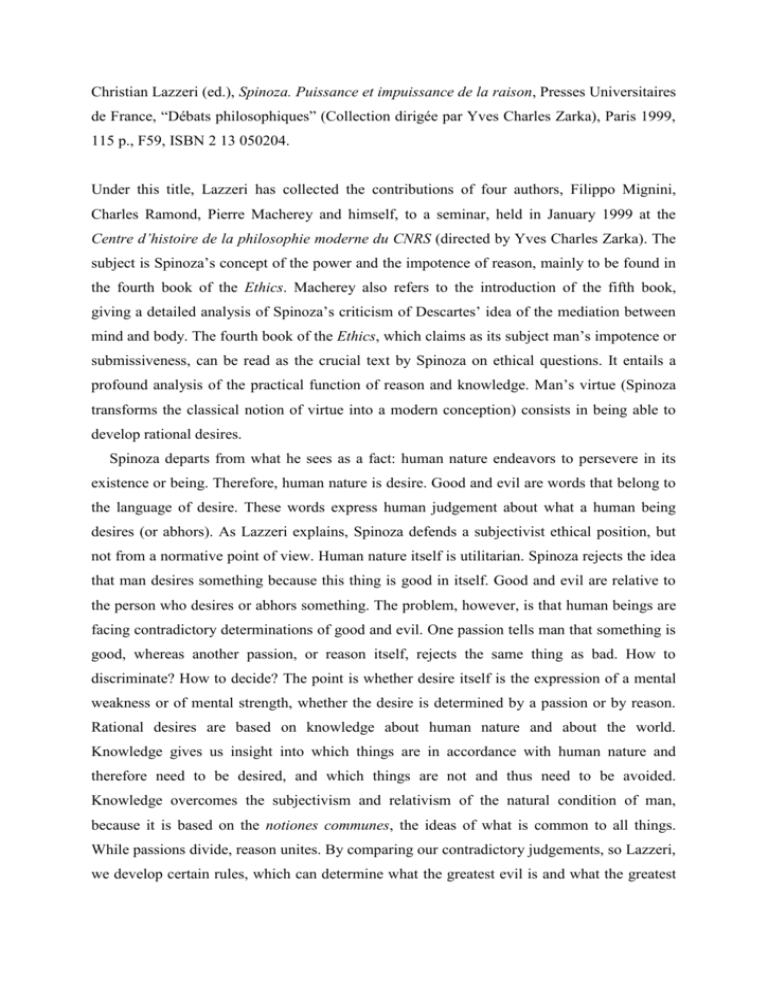
Christian Lazzeri (ed.), Spinoza. Puissance et impuissance de la raison, Presses Universitaires de France, “Débats philosophiques” (Collection dirigée par Yves Charles Zarka), Paris 1999, 115 p., F59, ISBN 2 13 050204. Under this title, Lazzeri has collected the contributions of four authors, Filippo Mignini, Charles Ramond, Pierre Macherey and himself, to a seminar, held in January 1999 at the Centre d’histoire de la philosophie moderne du CNRS (directed by Yves Charles Zarka). The subject is Spinoza’s concept of the power and the impotence of reason, mainly to be found in the fourth book of the Ethics. Macherey also refers to the introduction of the fifth book, giving a detailed analysis of Spinoza’s criticism of Descartes’ idea of the mediation between mind and body. The fourth book of the Ethics, which claims as its subject man’s impotence or submissiveness, can be read as the crucial text by Spinoza on ethical questions. It entails a profound analysis of the practical function of reason and knowledge. Man’s virtue (Spinoza transforms the classical notion of virtue into a modern conception) consists in being able to develop rational desires. Spinoza departs from what he sees as a fact: human nature endeavors to persevere in its existence or being. Therefore, human nature is desire. Good and evil are words that belong to the language of desire. These words express human judgement about what a human being desires (or abhors). As Lazzeri explains, Spinoza defends a subjectivist ethical position, but not from a normative point of view. Human nature itself is utilitarian. Spinoza rejects the idea that man desires something because this thing is good in itself. Good and evil are relative to the person who desires or abhors something. The problem, however, is that human beings are facing contradictory determinations of good and evil. One passion tells man that something is good, whereas another passion, or reason itself, rejects the same thing as bad. How to discriminate? How to decide? The point is whether desire itself is the expression of a mental weakness or of mental strength, whether the desire is determined by a passion or by reason. Rational desires are based on knowledge about human nature and about the world. Knowledge gives us insight into which things are in accordance with human nature and therefore need to be desired, and which things are not and thus need to be avoided. Knowledge overcomes the subjectivism and relativism of the natural condition of man, because it is based on the notiones communes, the ideas of what is common to all things. While passions divide, reason unites. By comparing our contradictory judgements, so Lazzeri, we develop certain rules, which can determine what the greatest evil is and what the greatest good is. With the second kind of knowledge (knowledge based on the application of rational rules), man already is able to master his passions and to attain rational desires. Mignini evaluates Spinoza’s idea of the potentia rationis, according to which an impotentia rationis is a contradiction in terms, in the light of what seems to be the central point in the first twenty propositions of part IV of the Ethics: the fact that reason is not able, for most of the time and for most people, to master the passions. In itself, reason is a power, but in relation to something else reason can be less powerful. Mignini does not see any contradiction here. Impotence does not exist in nature, concerning the things in themselves; it only exists as a result of the comparison of the strength of different things confronting each other. In a further elaboration, Mignini differentiates between the power of reason (in a relative sense) and the essence of reason. Reason is a set of rules or prescriptions. If human beings fail to apply these rules, the fault is not in the rules, but in man. At this point, Mignini takes the same position as Lazzeri: reason contains universal knowledge about what is common to all things. Next comes the question how man, not being able to use reason in an adequate way from the start, can free himself from the overwhelming impact of the affects. He cannot, Mignini claims. It is only by a fortunate constellation of affects that reason can play its salutary role. Ramond takes up a similar point. Spinoza’s Ethics can be read as a doctrine of human impotence (because even a wise man is not always wise), but also as a doctrine of human power. Ramond argues, that we need to see Spinoza’s concept of potentia as a relative one. His doctrine is about the degrees in human power. Nevertheless, we encounter in Spinoza’s texts an absolutist idea of the power of reason. How to explain this difficulty? We must make a difference between a quantitative and a qualitative analysis of potentia. In the first analysis, we see a greater or smaller amount of power; in the second analysis, we observe the ‘same’ and the ‘other’. For example, a qualitatively superior potentia can be quantitatively inferior. Ramond, too, sees the power of reason in the fact that its orientation toward the common features of the things in this world makes the rational affects more stable than the affects oriented toward the more contingent aspects of the world. The common features are always present. If we concentrate on them, our rational power becomes stronger and stronger, and is less and less determined by the many accidental feelings of everyday life. In Spinoza’s worldview, there is no power that cannot be destroyed by a greater power – except, of course, God’s power. This implies that the rationality of man differs from the rationality of nature: in the final analysis, man will always lose the game. Nevertheless, for Spinoza man and nature have much more in common. Therefore, the difference between rationalities can be overcome. Macherey discusses the difference between Descartes’ and Spinoza’s view on the use of the passions. According to him, Descartes did not, as a philosopher of the will, contemplate the conatus, as Spinoza did. Spinoza’s treatment of the mastering of the passions is an internalist one. The four contributions do not, as far as I can see, contradict each other. They all stress this internalist doctrine of the process in which man can become – to a certain degree – the master of his passions. The essays all start with a clear and restricted question, and try to answer it in a sophisticated way. They all stay within the boundaries of Spinoza’s text. As such, this little book is helpful to those, who are reading the fourth book of the Ethics or are planning to do so. After reading the contributions, I wondered what the seminar looked like. Did the contributors just read their papers? Was there any real discussion or controversy? If there was, it is a pity that it is not included in the book. Marin Terpstra Department of Philosophy, Radboud University of Nijmegen, The Netherlands
